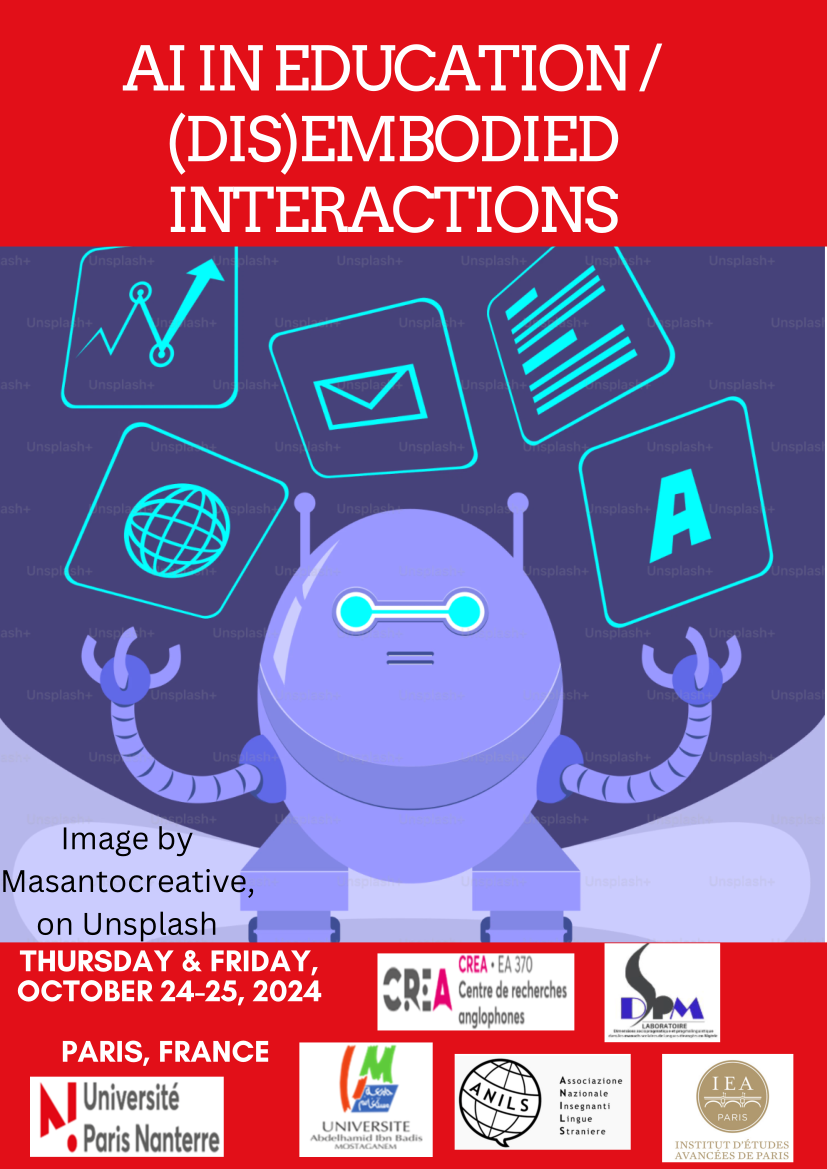All papers should be submitted on the following website:
https://ailanguagelearning.sciencesconf.org/
Advances in Artificial Intelligence (AI) are changing how languages are being taught and learned. Existing AI technologies can plan entire lessons for teachers and even provide realistic communication practice for learners; it is therefore important to analyze how these tools are being used and how they are shaping L2 learning experiences. Our aim is to bring together specialists in linguistics, language didactics, education, psychology, communications, and new technologies to discuss and reflect on how this technology is impacting language learning and education in general. We invite submissions on the following subthemes:
Subtheme 1: AI & Language Teaching
New ways of doing and thinking can become the basis for new habits, attitudes, and routines. Some critical educationalists such as Paulo Freire (1972) and more recent activity theorists such as Yrjö Engeström (1996) emphasized the role of learning in developing current interactive activities. Activity-level learning can be understood as creating and realizing an imagined future (Tuomi Ilkka, 2018). This concept provides insight into understanding artificial intelligence and its potential impact on human activities. That is, when AI enters social and professional development practices, it enhances and complements them, increasing the efficiency and effectiveness. Given the value of integrating AI applications into EFL classrooms and its benefits for skills-based education, we welcome all reflections and suggestions from researchers to understand the significance of AI applications, including automatic assessment systems, neural machine translation tools, intelligent teaching systems (ITS), intelligent chatbots, intelligent virtual environments, machine learning (ML), natural language processing (NLP), artificial neural networks (ANNs), and affective computing (AC) in reshaping teaching and learning. These AI tools are widely harnessed in the EFL context, with profound impacts (Imran & Almusharraf, 2023; Ruihong Jiang, 2022). Especially during the COVID-19 pandemic, video conferencing tools and learning management systems (e.g., Blackboard) supported by AI technologies were and continue to be widely implemented in online EFL teaching and learning (Layali & AL-Shlowiy, 2020).
Subtheme 2: AI & Language Learning
Deep and sustainable learning involves knowledge, understanding, problem-solving, creative reformulation, autonomy, critical thinking, and transferring knowledge to different contexts and social expectations. AI has revolutionized how students approach language learning, and the technology is constantly evolving. For years now, research has shown that students have been using AI for translation, improving their L2 grammatical accuracy, and developing speaking skills (Dodigovic, 2007; Kannan & Munday, 2018; Lewis Johnson, 2010). While some fear that students will become too dependent on AI, studies suggest that AI can actually increase learner autonomy and make them more independent and motivated, particularly when it comes to correcting errors (Harisitiani, 2019; Kannan & Munday, 2018; Song & Song, 2023). Furthermore, this technology may have a positive impact on self-confidence and reduce L2 anxiety, as learners find it easier and less stressful to practice with chatbots instead of people (Fryer & Carpenter, 2006; Harisitiani, 2019). For this subtheme, we invite papers that address students' use of AI technologies, including how AI impacts language acquisition, contexts and motivations for AI use, the effect AI has on learner autonomy, technology and socialization, AI and the development of communication skills, AI use across cultures, and the relationship between AI use and the learner's cognitive-affective states.
Subtheme 3: AI, Institutions & Policies
Teachers and students are at the frontline of AI growth in academia; students have been using online editors and translators in their language courses for years, while teachers have had to assume the task of guiding them in proper use. As a result, governments and institutions will have to play catch-up to create policies that respond to the challenges and opportunities presented by this new technology (Gwagwa, Kraemer-Mbula, Rizk, Rutenberg & de Beer, 2020). The expected advantages are numerous; AI has been shown to be able to predict learner achievement, overcoming shortcomings of the traditional classroom, and reduce teachers' workload (Buddhima Sandaruwani Keerthiwansha 2018; Chaudry & Kazim, 2022). Other factors, such as the currently high cost and relatively advanced technical know-how required to use new technology, need to be anticipated (Hwang & Chien, 2022; Tanveer, Hassan & Bhaumik, 2020). Furthermore, a deeper discussion about ethics in relation to AI is needed (Bakiner, 2022). The most obvious concern is academic integrity, as cheating becomes increasingly difficult to detect (Abd-Elaal, Gamage, & Mills, 2019; Rogerson, 2020). Instructors, too, can be faced with ethical concerns; with AI being able to predict student achievement, there is a risk that such predictions impact treatment and future evaluations (Chaudy & Kazim, idem). We welcome contributions that analyze the implementation of AI policies in academic settings, ethical concerns surrounding AI in the classroom, and the large-scale use of AI in syllabi or curricula.
We also welcome proposals for practical workshops from language teachers and teacher trainers at all levels. These presentations should clearly present how to incorporate a specific AI tool in the language classroom.













